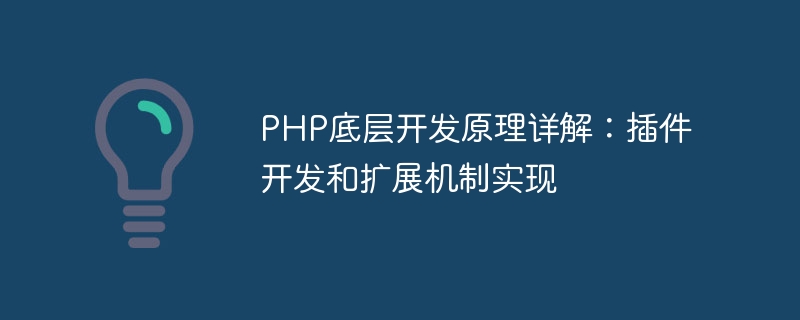

Detailed explanation of the underlying development principles of PHP: plug-in development and extension mechanism implementation
Introduction:
In the process of PHP application development, we often use various plug-ins and extensions to increase functionality and performance. How are these plug-ins and extensions implemented? This article will analyze in detail the implementation principles of PHP plug-in development and extension mechanisms from the perspective of underlying development, with code examples attached.
1. Plug-in development
Plug-in can be understood as an optional, pluggable functional component that can be run and expanded independently in the application. In PHP, the key to plug-in development is to use the extension mechanism.
1.1 Extension mechanism
Extension is the core library of PHP, which implements specific functions through an extension function library written in C language. In the PHP source code directory ext/, you can find a large number of extension modules, such as ext/mysql, ext/curl, etc. These extension modules provide a variety of functions and classes that can be dynamically loaded and called through the extension mechanism.
1.2 Plug-in development steps
Plug-in development usually includes the following steps:
1) Write C language extension code: First, we need to use C language to write the specific implementation code of the plug-in. For example, if we want to write a plug-in to implement an image processing function, we can write a C language source file containing the corresponding functions and classes.
#include <php.h>
PHP_FUNCTION(image_resize) {
// 实现图片处理功能
}
// 注册扩展函数
zend_function_entry plugin_functions[] = {
PHP_FE(image_resize, NULL)
{NULL, NULL, NULL}
};
zend_module_entry plugin_module_entry = {
STANDARD_MODULE_HEADER,
"image_plugin",
plugin_functions,
NULL,
NULL,
NULL,
NULL,
NULL,
"1.0",
STANDARD_MODULE_PROPERTIES
};
ZEND_GET_MODULE(plugin)2) Compile and generate extension library: After writing the extension code, we need to compile it into a dynamic link library for PHP to load at runtime. Compilation can be done using the tools provided by PHP.
$ phpize $ ./configure --with-php-config=<php-config-path> $ make $ make install
3) Register extension: Registering a plug-in tells PHP to load the plug-in at runtime. You can register the plug-in in the PHP configuration file by adding the following configuration:
extension=image_plugin.so
4) Using the plug-in: After registering the plug-in, we can use the functions provided by the plug-in in the PHP code. For example, use the image_resize function in the plug-in to implement the image processing function:
<?php
$image = image_resize("image.jpg", 800, 600);
?> 2. Extension mechanism implementation
The extension mechanism is one of the underlying core mechanisms of PHP, which provides powerful support for plug-in development. Understanding the implementation principle of the extension mechanism will help us better understand the process and principles of plug-in development.
2.1 Zend engine
The Zend engine is the interpreter and compiler of PHP. It is responsible for parsing, compiling and executing PHP code. Zend engine has two important components: Zend language core (Zend Core) and extension support library (Extension Support Library).
2.2 Principle of extension implementation
The core of PHP extension implementation is to use the extension support library of the Zend engine. The extension support library is a set of function libraries written in C language that provides various tools and interfaces required for extension development.
2.3 Extension structure
Each PHP extension has a module structure, which contains module information and entry functions. For example, the plug-in structure in the previous example is as follows:
zend_module_entry plugin_module_entry = {
STANDARD_MODULE_HEADER,
"image_plugin",
plugin_functions,
NULL,
NULL,
NULL,
NULL,
NULL,
"1.0",
STANDARD_MODULE_PROPERTIES
};2.4 Zend kernel
Zend kernel is the core module of PHP, which is responsible for parsing and executing PHP code. When the PHP interpreter is initialized, the Zend kernel module is loaded and each extension module is registered.
2.5 Extension loading
When the PHP interpreter encounters the need to use the functions provided by the extension at runtime, it will load the corresponding extension module according to the extension registered in the configuration file. When an extension module is loaded, PHP reads the module's structural information and registers it with the kernel, making it available for PHP code calls.
Summary:
This article analyzes in detail the implementation principles of PHP plug-in development and extension mechanism from the perspective of underlying development. By writing C language extension code, compiling and generating extension libraries, registering extensions and using plug-ins, we can achieve various function expansions and performance optimizations. Being familiar with the implementation principles of the extension mechanism will be of great help to our in-depth understanding of PHP underlying development and plug-in development.
The above is the detailed content of Detailed explanation of PHP underlying development principles: plug-in development and extension mechanism implementation. For more information, please follow other related articles on the PHP Chinese website!




